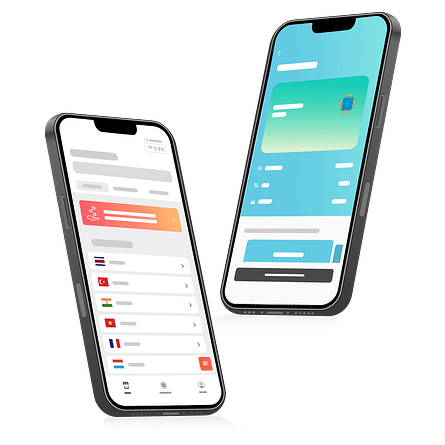
Ready to rock your next business trip to China like a total pro?
Whether you’re a digital nomad juggling client calls or a seasoned executive, understanding China’s unique business culture, mastering proper business manners, and respecting local business protocols can make all the difference.
From the art of Guanxi (关系) to smart packing strategies, this no-fluff guide is your go-to roadmap for navigating every step of your China business adventure.
Inside, you’ll find a practical packing list, discover why eSIMs beat physical SIM cards and hotel Wi-Fi, and get insider tips on handling meetings and etiquette like a local.
What to Pack for a Business Trip to China
China eSIM
Cutting the cord on physical SIM cards? Yes, please.
A China eSIM is a game-changer for anyone serious about staying connected without the usual headaches. Here’s why you need to get a China eSIM:
- Budget-friendly: Unlimited data for just $3.50 per day
- Uninterrupted access to tools: Access to tools blocked in China, like Zoom, Google Maps, Gmail
- Skip airport lines: Activate your eSIM before landing and stay connected instantly
- Instant setup: No SIM swapping needed, connect from anywhere—even mid-flight
- Strongest signal: Auto-switches between Chinese networks for reliable coverage
- No paperwork: Avoid local ID registration hassles
- Keep your number: Use your eSIM for data while keeping your original SIM active for calls and texts
A China eSIM is your digital passport for easy connectivity. That way, you don’t have to hunt down local vendors or deal with paperwork at the airport.
Asia Regional eSIM
If your China business trip is part of a broader Asian adventure, consider an Asia regional eSIM. It’s perfect for moving between countries like Japan, South Korea, Thailand, and China.
Here are some benefits of using an Asia regional eSIM:
- Budget-friendly: About $1.03 per day for 100 GB of data for 180 days
- Border-crossing simplicity: Cross borders without swapping SIM cards
- Stable connection: Reliable speeds across multiple countries
- Single billing convenience: Simplified payments for easy expense tracking
- Emergency network backup: Auto-switch to available networks if one fails
- Extended validity periods: Ideal for extended or multi-country trips
- No setup hassle: Consistent settings across borders, no tech fuss
An Asia Regional eSIM is like having a universal key to the continent's connectivity.
One activation, multiple countries, zero SIM card juggling.
Business Attire and Presentation
When you step into a business meeting in China, your outfit is a silent handshake, a first impression that speaks volumes. In formal settings, lean towards classic, conservative attire.
Unsplash
Think tailored suits or dresses in neutral tones like navy, black, or gray. Avoid anything too flashy or casual; your Chinese counterparts will appreciate the respect you show through your professional appearance.
But don’t stress, it’s not all stiff suits.
For less formal or creative meetings, business casual with a polished edge is perfectly acceptable. Layer smartly, because China’s vast geography means the weather varies wildly. Shanghai’s humidity is a far cry from the chillier northern cities like Beijing or Harbin.
Also, seasonality plays a key role in packing. Always check the forecast ahead of time and pack a versatile wardrobe that can handle a sudden shift.
Tech & Productivity Essentials
On a business trip, your gadgets are your lifeline. So don't just throw your laptop and charger in your bag and hope for the best. Here's your essential tech checklist to keep your China business trip fuss-free:
- Chinese payment apps: Set up Alipay or WeChat Pay before your trip so you can pay like a local.
- Power adapters for China's plugs (Type A, C, and I): Take these because China likes to keep things interesting with multiple plug types
- Portable power bank: Business days can stretch on, and outlets aren't always within arm's reach
- Business cards with Mandarin translation: This is still king in China's business culture, and having yours translated shows respect and makes connections stick
- Digital backup of cards and contacts: Losing paper networking gold when you're on the move is a nightmare you can avoid
Also, you can download WeChat before you go, for Chinese business communication.
Health & Personal Care
Staying healthy in a new country while juggling work can feel like a mini adventure, minus the fun if you come unprepared. Pack smart to maintain your energy and sharpness for every meeting:
- Small health kit with regular medications, pain relievers, and any prescriptions you need.
- Hand sanitizer and travel-sized hygiene products: Those little comforts make all the difference in busy days of meetings and travel.
- Face mask: The air quality varies in big cities, so pack one if you're sensitive to pollution.
- Bottled or filtered water: This is safer than tap water and keeps you hydrated throughout long business days.
- Electrolyte packets: This is your defense against the dreaded dehydration slump during marathon meeting sessions.
Also, check if your health insurance covers international emergencies before traveling. Pharmacies are widely available, but prescription medications may require local doctor visits.
Bonus Packing Tips
Let's get a bit tech-savvy here because your digital life needs bulletproof protection. Here are the essentials you need:
- Cloud backups: Your laptop or phone crashing in the middle of a client project is nightmare fuel, so upload work regularly and keep copies on secure cloud platforms so you can access everything from any device.
- Password managers: This will save you from the dreaded "forgot password" black hole and keep accounts locked tight on public Wi-Fi
- Emergency contact documentation: Include your embassy, local emergency numbers, and key business contacts in both digital and physical formats.
And while we’re at it, invest in international travel insurance that covers your tech gear and health.
It may not be the flashiest item in your suitcase, but when things go sideways (and sometimes they do), this keeps your mind free to focus on what matters: closing deals and making connections.
Business Etiquette Tips in China
First Impressions and Greetings
When you land in China ready to seal deals, your first impression is everything. Think of it as your business passport. A firm handshake is polite but gentle, never a bone-crusher.
Present your business card with both hands, face up, and make sure it's printed in English on one side and Mandarin on the other. This little gesture signals respect and preparation, showing you've done your homework.
Remember, names are essential, so take a moment to learn how to pronounce your contacts' names correctly. If you can learn to pronounce Arnold Schwarzenegger and Nicole Scherzinger, you can learn to pronounce Zhang Yiming and Wang Chuanfu.
It's a small effort that goes a long way in Chinese business culture.
Don't jump straight into business talk immediately after greetings. Instead, ease into the conversation with some light small talk about health or family.
Also, never write on someone's business card or shove it into your pocket; treat it like a prized keepsake. These subtle nuances keep interactions smooth and respectful.
Understanding Hierarchy and Respect
China's business world operates on a hierarchical structure like a well-oiled machine.
Chinese business etiquette emphasizes hierarchy, respect, and indirect communication, with respect for authority being deeply ingrained.
Always address the highest-ranking person first in meetings, wait for them to sit before you do, and present your cards to the senior person first. Use titles and surnames – "Mr. Zhang" or "Director Li" – rather than jumping straight to first names.
Understanding hierarchy isn't about being stuffy; it's about showing cultural intelligence.
When you respect the chain of command, you're basically saying, "I get it, I respect your culture," which opens doors faster than any elevator pitch ever could.
The Art of Communication Style
Forget everything you know about direct communication; in China, it's all about reading between the lines.
Chinese business communication tends to be indirect and subtle, with a strong emphasis on maintaining harmony and avoiding direct confrontation.
Think of it like a graceful game of chess rather than a boxing match. Instead of saying "That won't work," you might hear "That's an interesting perspective, let's explore other options."
For someone used to Zoom calls and quick decisions, this can feel frustrating. But here's the secret: embrace the pause.
Those moments of silence aren't awkward, but they're strategic thinking time. Use them to your advantage, and you'll find that patience pays off in spades.
The Concept of Face (Mianzi, 面子)
The concept of face ("Mianzi") is central to business interactions.
Think of "face" as someone's professional reputation and dignity rolled into one precious package. Chinese people value their "face" and do not want to lose it.
In practical terms, this means never embarrassing someone in public or challenging their authority in front of others. If you disagree with something, save that conversation for a private moment.
The flip side? When you help someone save face or even "give face" by acknowledging their expertise publicly, you've just made a friend for life.
It's like depositing relationship currency in the bank, and trust me, you'll want to make plenty of these deposits.
The Concept of Guanxi
If you think business in China is all about contracts and cold facts, think again. Guanxi is the art and science of building personal connections, and it's at the heart of every deal.
It's not just about what you know, but who you know and the trust you build over time.
Guanxi is your secret weapon, the currency that unlocks smoother negotiations and opens doors to new opportunities. Without it, even the best business plan can hit a wall.
Building guanxi takes patience and genuine effort. Sharing meals, attending events together, and exchanging favors all help strengthen these bonds.
As someone doing business with Chinese clients, recognizing and respecting guanxi demonstrates that you're committed to the long term, not just a one-time transaction.
Gift-Giving Etiquette and Protocols
Gift-giving in China is like walking a tightrope: it can strengthen relationships or land you in hot water if you're not careful.
Unsplash
Gift-giving and hospitality are long-standing traditions in mainland Chinese culture, and they continue to play a significant role in cultivating relationships.
Stick to thoughtful, modest gifts that represent your home country or company, like quality pens, books about your culture, or tasteful desk accessories.
Avoid anything too expensive (it screams bribery), anything in sets of four (unlucky number), or white flowers (associated with funerals).
Present gifts with both hands, and don't be surprised if your Chinese colleague doesn't open it immediately. That's normal and shows restraint, not rudeness.
Meetings and Negotiations
Scheduling a meeting in China isn't just about picking a date and time. Flexibility and patience are your best friends.
Unsplash
Often, meetings begin with a brief period of casual conversation before moving on to the core business. Don't mistake silence for disinterest; it's a strategic pause that reflects careful thinking, not awkwardness.
Be prepared for a slower negotiation pace because decisions are often made collectively and require multiple rounds.
Additionally, punctuality is expected, as arriving on time demonstrates professionalism and respect. Expect indirect communication, as reading between the lines is a must. Avoid confrontation or blunt refusals.
Instead, use subtlety and diplomacy to express disagreement or hesitation. Mastering this dance will help you navigate China's business protocol with finesse.
Business Entertainment and Socializing
Business entertainment in China goes way beyond your typical happy hour. It's relationship-building on steroids.
iStock
Karaoke (KTV) is a common part of business socializing in China. Participation, not performance, is what matters. Showing openness builds rapport.
Business dinners can stretch for hours, with multiple courses and lots of toasting. The key is to pace yourself and follow your host's lead. Don't be the person who gets too comfortable too quickly.
Instead, maintain your professionalism even when the atmosphere gets relaxed. These social moments are where real business magic happens, so embrace them as part of your China adventure.
Dining Etiquette and Socializing
Business meals in China aren't just about food; they're a social performance where trust and respect are served alongside delicious dishes.
iStock
When you're invited to dinner, expect a round table filled with shared dishes. It's polite to wait for the host to signal the start of eating, usually by tapping the table lightly.
Navigating chopsticks with finesse may take some practice, but don't stress, it's your willingness to engage that counts.
When it comes to the bill, the host typically covers the expenses, and it's considered rude to offer to pay unless you're in a very close relationship.
Toasting is another vital ritual: raising your glass and saying ganbei (cheers) signals goodwill and camaraderie. Don't be shy to participate, but pace yourself because losing your cool won't score you points here.
Small talk flows around family, culture, and non-controversial topics. Master these moments, and you'll find that dining becomes a powerful extension of your business travel to China.
Bonus Tips for a Smooth Business Trip
Navigating Local Transportation
Navigating transportation in major Chinese cities can be fast-paced and crowded, especially during rush hours.
But don’t sweat it; taxis are everywhere and easy to flag down, especially if you have your destination written in Chinese characters or ready on a translation app.
Additionally, ride-hailing apps like Didi are convenient, reliable, and a must-have for a business trip in China. In big cities, the metro is your quickest and cheapest friend, though rush hours can get packed.
Staying Safe and Healthy
Air quality in many Chinese cities can be a challenge, so packing a good mask is a smart move. Keep hydrated and carry hand sanitizer because travel germs aren’t fun when you’ve got meetings.
When it comes to food, trust your instincts: busy local spots usually mean safer and tastier meals. Also, save emergency numbers and have your insurance info handy. Hospitals often have English-speaking staff, but preparation is your best defense.
Taking care of your health keeps you sharp and ready for whatever the trip throws at you.
Wrapping Up Your China Business Trip
Heading to China for work?
You’ve got the business etiquette down and your packing list locked. You’re not just crossing time zones but stepping into a culture where connection, respect, and preparation carry serious weight.
So, staying online is non-negotiable. That’s where a China eSIM from Airalo quietly saves the day. No SIM-card fumbling. No dodgy hotel Wi-Fi. Just you, your phone, and instant connectivity that works as hard as you do.
Why consider a China eSIM?
- Instant connectivity the moment you land, with no SIM swapping drama
- Reliable, fast internet to power through calls and emails
- Flexibility to switch plans without changing cards
- Saves space in your phone and hassle in your schedule.
Pack light, power up, and let the real adventure (and business) begin.



